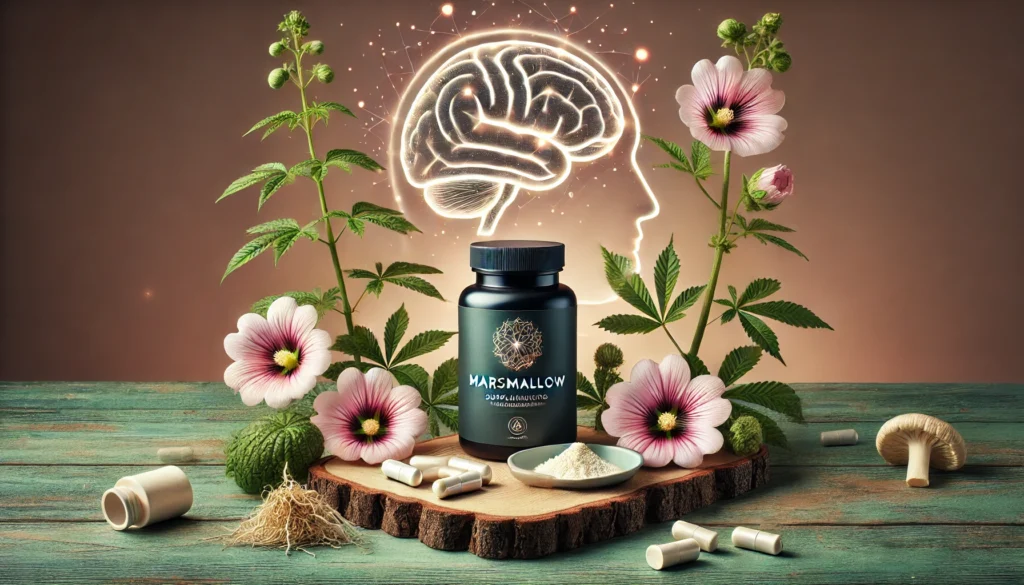Marshmallow, scientifically known as Althaea officinalis, is a herbaceous plant native to Europe and Western Asia, with a long history of medicinal use. Its roots, flowers, and leaves have been utilized in traditional remedies for ailments ranging from respiratory conditions to digestive issues. Recently, marshmallow has attracted attention for its potential as a nootropic supplement, primarily due to its effects on cognitive function and its supportive role in promoting overall brain health.
This article explores the chemistry, physiological mechanisms, nootropic benefits, dosage guidelines, potential side effects, interactions, and other considerations for marshmallow supplementation.
You May Also Like:
Sources of Marshmallow
The most commonly used part of the marshmallow plant for medicinal purposes is the root, which contains a rich array of bioactive compounds. Marshmallow root is a source of mucilage—a sticky, gelatinous substance known for its soothing and anti-inflammatory properties. The herb has been historically valued in both European and Ayurvedic traditions, often prescribed for soothing the throat, treating coughs, and alleviating digestive discomfort.
Marshmallow is widely available in various supplement forms, including powders, capsules, teas, and tinctures. Its leaves and roots can also be found in herbal preparations aimed at soothing the digestive and respiratory systems. These forms are particularly useful for those interested in leveraging marshmallow’s potential as a nootropic supplement.

Chemistry of Marshmallow
The primary active components of marshmallow are its mucilaginous polysaccharides, including arabinose, galactose, and rhamnose. These compounds are primarily found in the plant’s roots, where they interact with water to form a gel-like substance. This gel has been shown to have soothing effects on mucous membranes, particularly in the digestive and respiratory tracts. Additionally, marshmallow root contains flavonoids, phenolic acids, and anthocyanins, all of which contribute to its antioxidant properties.
The mucilage compounds in marshmallow have an ability to coat the digestive tract, potentially reducing irritation or inflammation, which may support cognitive function by promoting a healthy gut environment. It is well-known that gut health has a profound impact on brain health, often referred to as the “gut-brain axis.” The anti-inflammatory properties of marshmallow may have neuroprotective effects, supporting the delicate balance necessary for optimal brain function.
Physiological Mechanisms of Marshmallow in the Body and Brain
The primary action of marshmallow on the body is its mucilaginous effect. This action is thought to benefit both the gastrointestinal system and the respiratory system, both of which are intricately connected to brain health. Here are the mechanisms by which marshmallow may influence brain function:
- Gut-Brain Axis Support: A growing body of research highlights the bidirectional communication between the gut and the brain. The soothing mucilage of marshmallow root may help promote a healthy gut environment by reducing gastrointestinal inflammation, which in turn could have a positive effect on brain health. Given the well-documented connection between gut health and cognitive function, marshmallow’s ability to maintain digestive balance could potentially enhance mental clarity, focus, and overall cognitive performance.
- Anti-Inflammatory and Antioxidant Properties: Marshmallow contains flavonoids and phenolic compounds, which are well known for their antioxidant and anti-inflammatory properties. These bioactive components may help to reduce oxidative stress and inflammation in the brain, both of which are thought to contribute to cognitive decline and neurodegenerative diseases. By protecting neurons from oxidative damage, marshmallow may offer neuroprotective benefits, potentially preventing or slowing the progression of conditions like Alzheimer’s and Parkinson’s disease.
- Cognitive Function Enhancement: While not traditionally classified as a nootropic, marshmallow’s anti-inflammatory properties may indirectly support cognitive function. Inflammation in the brain can lead to issues such as brain fog, poor concentration, and memory problems. By reducing inflammation and promoting gut health, marshmallow may help enhance cognitive clarity and focus, though more clinical evidence is needed to fully validate its use as a nootropic supplement.

Nootropic Benefits of Marshmallow
Marshmallow’s potential as a nootropic is largely attributed to its systemic benefits, particularly in reducing inflammation, promoting gut health, and protecting the brain from oxidative damage. Here are some additional potential nootropic benefits of marshmallow supplementation:
- Improved Mental Clarity and Focus: By reducing gut inflammation and promoting a healthier gut-brain axis, marshmallow may contribute to better cognitive function. A balanced gut can help regulate the production of neurotransmitters like serotonin and dopamine, which are critical for mood, focus, and overall cognitive performance.
- Neuroprotection and Cognitive Longevity: The antioxidant and anti-inflammatory compounds in marshmallow may have neuroprotective effects. Oxidative stress is known to damage brain cells and has been linked to age-related cognitive decline. By acting as an antioxidant, marshmallow could potentially protect neurons and slow the development of neurodegenerative diseases, enhancing cognitive longevity.
- Support for Emotional Well-Being: Gut health has been shown to play a role in mental health, influencing emotional stability, mood regulation, and even stress responses. Marshmallow’s ability to soothe the digestive system may indirectly promote emotional well-being by reducing gut-related stress, potentially supporting an improved mood and mental health.
- Enhanced Memory Function: The anti-inflammatory properties of marshmallow may aid in enhancing memory function. Chronic inflammation in the brain can impair memory and learning abilities, and marshmallow’s natural compounds may help reduce such inflammation, leading to better retention and recall.
- Reduction of Anxiety and Stress: By supporting the gut-brain axis, marshmallow may help reduce anxiety and stress levels. The soothing effects on the digestive system can indirectly influence stress hormone regulation, promoting a sense of calm and relaxation that supports cognitive performance.
- Better Sleep Quality: Gut health has a direct impact on sleep regulation. Marshmallow’s soothing properties may improve sleep by reducing gut-related discomfort and inflammation, leading to more restful sleep, which is vital for brain function and mental clarity.

Dosage and Supplementation Guidelines
As with any supplement, determining the appropriate dosage is crucial for maximizing benefits while minimizing potential risks. The optimal dose for marshmallow can vary based on the form of supplementation and the specific health goals of the individual. Here are general dosage guidelines:
- General Dosage: For general health benefits, a typical dosage of marshmallow root extract ranges from 500 mg to 1,000 mg per day, taken in capsule or powder form. For those seeking cognitive support or digestive health benefits, doses on the lower end of this range may suffice.
- For Gut Health: When used to support gastrointestinal health, particularly to soothe and protect the digestive tract, higher doses may be used. A common recommendation is 1,500 mg to 3,000 mg per day, split into two or three doses.
- Form of Supplementation: Marshmallow is available in various forms, including capsules, powders, tinctures, and teas. The choice of form depends on individual preferences and convenience. The powdered form is often considered more versatile, as it can be mixed with water, smoothies, or other beverages.
- Consultation with Healthcare Providers: Given marshmallow’s mucilaginous nature and its potential to interact with medications that affect digestion, it is advisable to consult with a healthcare provider before starting supplementation, especially for individuals with pre-existing gastrointestinal conditions or those taking other medications.
Side Effects and Safety
Marshmallow is generally considered safe when used as a supplement, with few reported side effects. However, as with any herbal supplement, some individuals may experience mild adverse reactions. Common side effects include:
- Digestive Discomfort: Although marshmallow is known for its soothing effects on the gastrointestinal tract, some individuals may experience mild bloating, gas, or diarrhea, particularly at higher doses. These symptoms are generally temporary and resolve once the body adjusts to the supplement.
- Allergic Reactions: While rare, some individuals may be allergic to marshmallow. Symptoms of an allergic reaction may include rashes, itching, or swelling, particularly in those with known sensitivities to other plants in the Malvaceae family.
- Interference with Drug Absorption: Due to its mucilaginous properties, marshmallow may slow the absorption of certain medications. It is recommended to take marshmallow supplements at least 1-2 hours apart from other medications to avoid potential interactions.

Interactions with Other Supplements and Medications
Marshmallow has the potential to interact with various medications and supplements, particularly those affecting the digestive system. Here are some notable interactions to consider:
- Medications for Digestion: Marshmallow’s mucilage may interact with drugs designed to treat gastrointestinal issues. For example, it could potentially affect the absorption of antacids, diuretics, or laxatives. Individuals using such medications should exercise caution and consult with their healthcare provider.
- Blood Pressure Medications: Marshmallow has mild diuretic properties, and when combined with prescription diuretics or blood pressure medications, it may cause excessive fluid loss or alterations in electrolyte balance. Regular monitoring of blood pressure and electrolyte levels is advised.
- Other Nootropic Supplements: Marshmallow is unlikely to cause significant interactions with other nootropics, but as it may influence gastrointestinal function, it is recommended to avoid taking it with supplements that could alter stomach acid levels or intestinal motility.
Risks for Individuals with Certain Health Conditions
Although marshmallow is generally safe for most individuals, those with specific health conditions may need to exercise caution:
- Pregnancy and Breastfeeding: There is insufficient research on the safety of marshmallow during pregnancy and breastfeeding. As a precautionary measure, it is best for pregnant or breastfeeding women to avoid marshmallow supplementation unless directed by a healthcare provider.
- Gastrointestinal Conditions: Individuals with chronic gastrointestinal conditions, such as irritable bowel syndrome (IBS) or Crohn’s disease, should consult a healthcare professional before taking marshmallow, as its mucilaginous properties could either aggravate or alleviate symptoms, depending on the individual case.
Conclusion: Should You Consider Marshmallow as a Nootropic?
Marshmallow, while not traditionally classified as a nootropic, shows promise as a supplement that supports brain health through its ability to reduce inflammation, promote gut health, and provide antioxidant protection. Its mild diuretic effects and mucilaginous properties make it a beneficial addition to supplements aimed at supporting both cognitive function and overall well-being. However, more research is needed to confirm its nootropic benefits specifically. Always consult a healthcare professional before starting any new supplement, especially if you have pre-existing health conditions or are taking medications.

References:
- What is Marshmallow? Retrieved from: https://pubmed.ncbi.nlm.nih.gov/30000899/
- Everything You Need to Know About Marshmallow Root. Retrieved from: https://www.healthline.com/health/food-nutrition/marshmallow-root
- What are the benefits of marshmallow root? Retrieved from: https://www.medicalnewstoday.com/articles/324860#_noHeaderPrefixedContent
- Marshmallow – Uses, Side Effects, and More. Retrieved from: https://www.webmd.com/vitamins/ai/ingredientmono-774/marshmallow
- Herbal Uses of Marshmallow Root. Retrieved from: https://www.verywellhealth.com/marshmallow-root-7485537
Important Note: The information contained in this article is for general informational purposes only, and should not be construed as health or medical advice, nor is it intended to diagnose, prevent, treat, or cure any disease or health condition. Before embarking on any diet, fitness regimen, or program of nutritional supplementation, it is advisable to consult your healthcare professional in order to determine its safety and probable efficacy in terms of your individual state of health.
Regarding Nutritional Supplements Or Other Non-Prescription Health Products: If any nutritional supplements or other non-prescription health products are mentioned in the foregoing article, any claims or statements made about them have not been evaluated by the U.S. Food and Drug Administration, and such nutritional supplements or other health products are not intended to diagnose, treat, cure, or prevent any disease.


